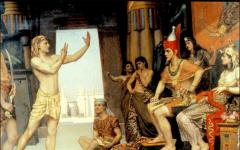What is the name of the famous Russian poet of the 19th century, in whose work contemporaries saw the embodiment of the “poetry of thought”, the author of the famous quatrain “Russia cannot be understood with the mind...”.
Question No. 2Name the second poetic movement in Russian literature half of the 19th century century, to which F.I. gravitated in his work. Tyutchev
Question #3What is the name of the artistic technique that allowed F.I. Tyutchev to endow natural phenomena with the properties of living beings?
Question #4What is the name in literary criticism for a combination of lines held together by a common rhyme and intonation in a poem?
Question #5Indicate the name of the means of artistic expression that F.I. uses. Tyutchev in the poem “Autumn Evening”, creating images of the autumn withering of nature: “Damage, exhaustion - and on everything that gentle smile of withering, Which in a rational being we call the Divine modesty of suffering”
Question #6What is the name of the Russian poet about whom L. Tolstoy said: “And where does this good-natured fat officer get such incomprehensible lyrical audacity, a characteristic of great poets?”
Question No. 7What is the name of the artistic technique based on the selection of homogeneous consonant sounds and giving the sound of A.A.’s poem? Feta special musicality?
Question #8Indicate the term that in literary criticism refers to the technique of artistic representation, which consists in the selection of colorful, color epithets: “blue and green fire”, “golden border”
Essay topics 17.2
What is unusual about the depiction of the natural world in the lyrics of F.I. Tyutchev?
Why are many poems by F.I. Tyutchev, representing a kind of “landscapes in verse”, are traditionally classified as philosophical lyrics?
What gives the theme of love in the lyrics of F.I. Tyutchev tragic sound?
Oh, how murderously we love,
As in the violent blindness of passions
We are most likely to destroy,
What is dear to our hearts!
How long ago, proud of my victory,
You said: she is mine...
A year has not passed - ask and find out,
What was left of her?
Where did the roses go?
The smile of the lips and the sparkle of the eyes?
Everything was scorched, tears burned out
With its flammable moisture.
Do you remember, when you met,
At the first fatal meeting,
Her magical gaze and speech,
And baby-like laughter?
So what now? And where is all this?
And how long was the dream?
Alas, like northern summer,
He was a passing guest!
Fate's terrible sentence
Your love was for her
And undeserved shame
She laid down her life!
A life of renunciation, a life of suffering!
In her spiritual depths
She was left with memories...
But they also changed.
And on earth she felt wild,
The charm is gone...
The crowd surged and trampled into the mud
What bloomed in her soul.
And what about the long torment?
How did she manage to save the ashes?
Pain, the evil pain of bitterness,
Pain without joy and without tears!
Oh, how murderously we love!
As in the violent blindness of passions
We are most likely to destroy,
What is dear to our hearts!
F.I. Tyutchev
Mood lyrical hero conveyed using figurative definitions (“ violent blindness", " flammable moisture"). Indicate the term that in literary theory denotes such artistic definitions.
What is the name of the artistic device used by the author in the fifth stanza: “Alas, like northern summer“He was a passing guest!”?
What is the name of the stylistic figure used by the author in the penultimate stanza (“ Pain, angry pain bitterness, // Pain without joy and without tears!”)?
8. How do you understand Tyutchev’s words “Oh, how murderously we love!”?
9. In which poems by Russian poets does the theme of love sound tragic?
There is in the initial autumn
Short but wonderful time –
The whole day is like crystal,
And the evenings are radiant...
Where the cheerful sickle walked and the ear fell,
Now everything is empty - space is everywhere -
Only a web of thin hair
Glistens on the idle furrow.
The air is empty, the birds are no longer heard,
But the first winter storms are still far away -
And pure and warm azure flows
To the resting field...
F.I. Tyutchev
Determine the meter in which F.I.’s poem is written. Tyutchev “There is in the primordial autumn.”
To create a poetic mood, the poet uses figurative definitions. What is the name of this artistic medium?
Indicate the means of allegorical expressiveness that Tyutchev uses to create a poetic image in the second stanza (“on idle furrow»).
To create a poetic mood F.I. Tyutchev uses the definitions “clean”, “warm”, etc. What is the name of this artistic medium?
8. Why F.I. Tyutchev, the singer of nature, is called a poet-philosopher?
9. Which Russian poets, depicting nature, tried to comprehend the eternal questions of existence?
The hazy afternoon lazily breathes;
The river rolls lazily;
And in the fiery and pure firmament
The clouds are lazily melting.
And all of nature, like fog,
A hot drowsiness envelops;
And now the great Pan himself
In the cave the nymphs are sleeping peacefully.
(F.I. Tyutchev, late 1820s)
Name the artistic technique of animating an inanimate object, used by F.I. Tyutchev (“... midday breathes...”).
What remedy artistic expression used by the author: “And all of nature, How
fog, // Hot sleep envelops you?
Determine the meter in which the poem “Noon” is written (without indicating the number of feet).
What term refers to the repetition of the initial parts of lines, which the poet resorts to:
Lazy the hazy noon breathes;
Lazy the river is rolling...?
8. How is the poet’s idea about the animation of nature expressed in the poem “Noon”?
9. Which of the Russian poets reflected the richness of the natural world and what is the purpose of F.I.’s poem? Tyutchev's "Noon" is in tune with the works of these poets?
What is the name of the sound repetition that connects the ends of lines in a poem: hazy - clear, river - clouds?
Be silent, hide and hide
And your feelings and dreams -
Let it be in the depths of your soul
They get up and go in
Silently, like stars in the night, -
Admire them - and be silent.
How can the heart express itself?
How can someone else understand you?
Will he understand what you live for?
A spoken thought is a lie.
Exploding, you will disturb the keys, -
Feed on them - and be silent.
Just know how to live within yourself -
There is a whole world in your soul
Mysteriously magical thoughts;
They will be deafened by the outside noise,
The rays of day will disperse, -
Listen to their singing - and be silent!..
(F.I. Tyutchev, 1830)
___________________________
¹ Silence! (lat.)
In the first stanza F.I. Tyutchev creates poetic image, using the technique of assimilation (“like stars in the night”). Name the type of trail.
In the second stanza, the poet sharpens the problem using a question that does not require an answer (“How can someone else understand you?”). What is this type of question called?
Name the type of statement in which a thought is expressed in a concise and figurative form (“A thought expressed is a lie”).
Define poetic meter poems by F.I. Tyutchev “Silentium!”
8. Why F.I. Tyutchev calls for silence?
9. Which of the Russian poets of the 19th century addressed the theme of the “inexpressible”?
11. Not what you think, nature...– date of writing: 1836
First published in C, vol. III, 1836, pp. 21-22. Stanzas 2 and 4, prohibited by censorship, are replaced here with periods. Reprinted by Nekrasov (without dots instead of missing stanzas) with the omission of verses 3 and 4 of the first stanza and corrections of verses 1 and 3 of the last in C, vol. XIX, 1850, no. 1, dep. VI, pp. 65-66. Included in C, vol. XLIV, 1854, pp. 9-10, ed. 1854, pp. 15 et ed. 1868, p. 18. Printed according to the list with Tyutchev’s amendments in ST (TsGALI, 505/54, pp. 12-13), but with the restoration of dots in place of the missing stanzas according to the first printed text.
Written no later than April 1836, since Tyutchev sent it to I.S. Gagarin in early May of this year.
D. D. Blagoy expressed the idea that “the polemical orientation of this poem by Tyutchev has a double address”: on the one hand, it refers to theological traditional church ideas that subordinate the laws of nature to the divine will, on the other hand, “vulgar mechanistic ideas about nature as a bare mechanism, a soulless machine" (D. Blagoy. Literature and reality. Questions of theory and history of literature. M., 1959, p. 446).
Apparently, the poet’s pantheistic worldview, unacceptable from an orthodox church point of view, was most clearly expressed in the stanzas of the poem that have not reached us, which attracted the attention of censors. On July 14, 1836, the St. Petersburg Censorship Committee approved the proposal of the censor A. L. Krylov, who examined the manuscript of Volume III C, to exclude these stanzas. Pushkin, for his part, insisted that the discarded stanzas be marked with dots. The absence of these stanzas violated the compositional integrity of the poem. The dots clearly indicated that this was the work of the censor, not the editor. See “Time Book of the Pushkin House”. Pg., 1914, p. 14; A. S. Pushkin. Full collection cit., vol. 16. Publishing house of the USSR Academy of Sciences, 1949. p. 144; E. Ryskin. From the history of Pushkin's Sovremennik. “Russian Literature”, 1961, No. 2, p. 199. Later, N.V. Sushkov asked Tyutchev to remember the missing stanzas in the poem, but the poet could not restore them in his memory. See LN, vol. 19-21, 1935, p. 377.
The oratorical intonation of the poem is reminiscent of G. R. Derzhavin’s angry and stern ode “To Rulers and Judges,” in which unworthy rulers are boldly condemned. Continuing the traditions of Russian civil poetry, Tyutchev unleashes his accusatory anger on those who are far from a “friendly conversation” with nature, who do not feel it in every manifestation.
The compositional structure of the poem, its poetic idea is determined by the antithesis of the first stanza, which is built on the opposition of mutually exclusive concepts cast, soulless face - soul, freedom, love, language. This opposition is embodied in the stylistic organization of the stanza, consisting of one sentence, in which the negation of not that... not that... is opposed by the affirmation of the four times repeated is. It is no coincidence that it was the first stanza of the poem that became part of the living heritage of the literary language and began to be used as a catchphrase.
An accusatory intonation, combined with a passionate affirmation of the idea of kinship between man and nature, permeates the entire Tyutchev poem. Repeatedly repeated negations no, no are combined with metaphorical images that create the spiritualized face of nature, where the suns “breathe,” forests “speak,” and where the thunderstorm “consults” with a person “in a friendly conversation.”
One of the means of artistic expressiveness of a poem is its intonation structure, in which the narrative-descriptive intonation of the first stanza is replaced by the searching-questioning structure of the second, and in the final stanzas it is replaced by an exclamation, inspiring the reader with a certain emotional attitude to the content of the work. ()
12. You can’t understand Russia with your mind...– date of writing: 1866
First published in ed. 1868, p. 230, dated "November 28, 1866." (
Search
"Total: 38 1-20 | 21-38
Depicting the first thunder, Tyutchev writes that it rumbles “frolic and playing.” Indicate the name of this technique of allegorical expressiveness.
F. I. Tyutchev, 1828-1854
Explanation.
This technique is called personification. Let's give a definition.
Personification is a poetic trope, attributing properties and characteristics of animate objects to inanimate ones.
Answer: personification.
Answer: personification
Read below lyrical work and complete tasks B8-B12; SZ-S4.
F. I. Tyutchev, 1828-1854
Explanation.
Tyutchev's lyrics reflected the philosophical thought of his era, the thought about the existence of nature and the universe, about the connections of human existence with universal life. The paintings of nature embody the poet’s thoughts about life and death, about humanity and the universe. Human feelings are outlined against the background of nature.
It is not surprising that the predecessors of F.I. Tyutchev can be called the most popular poets of the first half of the 19th century: landscape lyrics found in M.Yu. Lermontov (“When a yellowing field is agitated...”, where the author personifies nature and talks about what surge of strength it can give), and love is most clearly expressed in A.S. Pushkin (“I loved you, love is still, perhaps...”, dedicated to one of his beloved).
The connection between Tyutchev’s style and Zhukovsky’s poetics is significant. Their kinship was largely determined by the two poets belonging to the same artistic movement - romanticism. From Zhukovsky, Tyutchev inherited bright and high emotionality, deep concentration, artistic subjectivity of vision and an ever-present desire to reveal the “human soul.”
A special place in Tyutchev’s creative world was occupied by the work of A.S. Pushkin. Despite his own poetic preferences and predilections, Tyutchev early realized the dominant role of Pushkin in Russian poetry. In the eyes of his contemporaries, Tyutchev was perceived as a poet who worked in the same vein as Pushkin and was influenced by him. Tyutchev’s poem “When in a circle of murderous worries” (1849) resurrects Pushkin’s six-line poem “I have matured among sad storms” (1834). The authors experience the happiness of momentary joy, temporary peace. Both of them compare this consolation with related phenomena in nature. And also both foresee the temporary nature of mental and natural renewal. But Tyutchev believes much less in the possibility of spiritual bliss and colors his lines with bitter skepticism.
The unique artistic creativity of the poet Tyutchev adopted the wonderful traditions of Russian classics.
F. I. Tyutchev, 1870
Explanation.
The lyrical hero of the poem F.I. Tyutchev’s “I Met You...” is under the power of late love. He is no longer young, so he compares the surging feeling to the breath of spring “in late autumn.” The feeling captured the lyrical hero entirely, without a trace, he emphasizes that life has become somehow unreal: “like in a dream.” Love, in Tyutchev’s understanding, is the biggest shock in a person’s life.
The lyrical hero of A. Tolstoy’s poem “In the midst of a noisy ball, by chance...” In it, the poet tried to convey the impressions of his first meeting with the one who would later become his wife. The stranger was above the bustle of society and kept herself apart, while a certain imprint of mystery lay on her face. “Only the eyes looked sad, and the voice sounded so wonderful,” the poet notes. At the moment of creating the poem “In the midst of a noisy ball, by chance...” he idealizes his chosen one, noting that he dreams of her both in his sleep and in reality.
Blok can also be considered a follower of Tyutchev in revealing the theme of love. In the poem “About exploits, about valor, about glory...” the poet preaches: love elevates a person above everyday life, love is an all-consuming mystery, it can give strength, it can deprive them. When the moment of separation comes, devastation sets in. The attitude of the lyrical hero towards his beloved is striking: he almost deifies her (“... you didn’t look back,” “... you didn’t descend”). Deification can also be noted in such details as the ghostliness, the almost non-existence of the beloved. The hero, despite the separation, calls his beloved “sweet”, “tender”, which speaks of his ability to love sacrificially, fully.
It is love that fills with meaning, inner burning, makes the human heart tremble, contributes to the rise of the human mind and the spirituality of the entire world order - Tyutchev, Tolstoy, Blok wrote about this.
Arina Maksimova 01.05.2017 13:58
In my opinion, the answer is not accurate. The question is about the FEATURES OF THE PICTURE OF FEELINGS - that is, about HOW Tyutchev conveys the experiences of his lyrical hero. Here, it would probably be appropriate to mention Tyutchev’s “night” lyrics, his quiet nighttime revelations, the inextricable connection of his lyrics with nature, his ability to contemplate the world. It seems to me that similar moods fill the lyrics of Bunin and Fet.
And in the fragment given for clarification, Tyutchev’s attitude to love is revealed, and on the basis of only one specific poem. This does not answer the question.
Tatiana Statsenko
The answer is correct. Love is also a feeling revealed in a specific poem belonging to Tyutchev’s lyrics. There is a comparison with two more works by other authors in the answer.
The second and third stanzas of the poem are built on a comparison of pictures of nature and the human condition. What is this technique called in literary criticism?
Read the lyric work below and complete tasks B8-B12; SZ-S4.
F. I. Tyutchev, 1870
Explanation.
Comparison - comparison of objects or phenomena. These stanzas compare pictures of nature and the human condition.
Answer: comparison or parallelism.
Answer: comparison|parallelism
Shura Protskofieva 22.05.2016 21:18
I guess this could be a comparison. The second and third stanzas are connected by the union AS, ...SO. This is a clear comparison. The author draws a parallel between the state of nature and the human soul.
Tatiana Statsenko
You are right, although it is quite complex in structure, it is still a comparison. The answer has been corrected.
Tatiana Statsenko
Answer added
Anna Dmitrieva 01.02.2017 14:35
I think this is not just parallelism, but psychological parallelism
What means of allegorical expressiveness is used twice by the poet in the first stanza (“obsolete heart”, “golden time”)?
Read the lyric work below and complete tasks B8-B12; SZ-S4.
F. I. Tyutchev, 1870
Explanation.
This remedy is called an epithet. Let's give a definition.
Epithet is a figurative definition.
Answer: epithet.
Answer: epithet
Read the lyric work below and complete tasks B8-B12; SZ-S4.
F. I. Tyutchev, 1870
Explanation.
Such a hero is called lyrical. Let's give a definition.
The lyrical hero is a conventional hero whose experiences are conveyed by the author.
Answer: lyrical.
Answer: lyrical hero|lyrical
From the list below, select three names of artistic means and techniques used by the poet in the fourth and fifth stanzas of this poem (indicate the numbers in ascending order).
1) hyperbole
2) comparison
3) anaphora
5) epiphora
Read the lyric work below and complete tasks B8-B12; SZ-S4.
F. I. Tyutchev, 1870
Explanation.
Hyperbole (“centuries of separation”) is an exaggeration.
Comparison (“as if in a dream”).
Anaphora (“here...here; and the same...and the same...) - unity of command.
Answer: 123 or 234.
Answer: 123|234
Tatiana Statsenko
The assignment talks about the fourth and fifth stanzas, and you write about the first. Read the assignment carefully.
Alena Petrova 16.03.2017 19:35
5th stanza “centuries of separation” - epithet
Tatiana Statsenko
Alexandra Ivanova 29.03.2017 10:38
Option 134 is also possible (hyperbole, anaphora, epithet).
Tatiana Statsenko
No, if we consider the combination “centuries of separation” to be a hyperbole, and there are no other epithets in the 4th and 5th stanzas, then the answer will be 123, and if we change the hyperbole to an epithet, then 234, the answer you proposed cannot exist .
Determine the meter in which the poem is written (without indicating the number of stops).
Read the lyric work below and complete tasks B8-B12; SZ-S4.
F. I. Tyutchev, 1870
Explanation.
This poem is written in iambic meter. Let's give a definition.
Iambic is a two-syllable meter in which the stress falls on the 2nd syllable.
Answer: iambic.
Answer: iambic
Read the lyric work below and complete tasks B8-B12; SZ-S4.
F. I. Tyutchev, 1870
Explanation.
The lyrical hero of the poem “I Met You...” is under the power of late love. He is no longer young, so he compares the surging feeling to the breath of spring “in late autumn.” Thus, with the help of an expanded metaphor, the author manages to convey the hero’s experiences. In the first stanza of the poem, this state is emphasized by contrasting epithets: “outdated” heart - “golden” time. In order to focus on the strength of the hero’s experiences, the author uses numerous repetitions. An example of this is the last stanza: it presents anaphora (uniform principle):
There is more than one memory here,
Here life spoke again, -
And you have the same charm,
And that love is in my soul!..
The feeling captured the lyrical hero entirely, without a trace - with the help of the comparison “like in a dream,” he emphasizes that life has become somehow unreal.
Not everything in love can always be expressed in words - in the poem, the reticence is conveyed by ellipsis in the third, fourth, fifth stanzas - the poet seems to be immersed in his thoughts, giving the reader the opportunity to remember and think about his feelings.
Thus, using various poetic means, Tyutchev manages to convey the strength of feelings that gripped the lyrical hero.
What is the name of the technique used by Tyutchev to create the mood and rhythmic pattern of the poem: “The bird is not silent in the forest hubbub, AND hubbub forest and mountain noise..."?
Read the lyric work below and complete tasks B8-B12; SZ-S4.
F. I. Tyutchev, 1828-1854
Explanation.
This technique is called repetition. Let's give a definition.
Lexical repetition is a stylistic figure that consists of the deliberate repetition of the same word or speech structure in a visible area of the text.
Answer: repetition or lexical repetition.
Answer: repetition|lexical repetition
Tatiana Statsenko
Corrected))
Determine the meter in which the poem is written.
Read the lyric work below and complete tasks B8-B12; SZ-S4.
F. I. Tyutchev, 1828-1854
Explanation.
This poem is written in iambic meter. Let's give a definition. Iambic is a two-syllable meter in which the stress falls on the 2nd syllable.
Answer: iambic.
Select three titles from the list below artistic means and the techniques used by the poet in the second stanza of this poem (indicate the numbers in ascending order).
1) anaphora
2) metaphor
5) sound recording
Read the lyric work below and complete tasks B8-B12; SZ-S4.
F. I. Tyutchev, 1828-1854
Explanation.
Metaphor (“rain pearls” - raindrops like pearls, “young peals, the sun gilds the threads”, epithets (young, rainy), sound writing (alliteration - repetition of the consonants “R”, “L”).
Answer: 245.
Answer: 245
Read the lyric work below and complete tasks B8-B12; SZ-S4.
F. I. Tyutchev, 1828-1854
Explanation.
This rhyme is called cross rhyme.
Answer: cross.
Answer: cross|cross
Polina Bondar 16.05.2016 22:13
But rhyme can be male/female. And “cross” is a way of rhyming. The assignment was written incorrectly. Indeed, in this poem, lines 1 and 3 are united by a feminine rhyme, and lines 2 and 4 by a masculine one.
Tatiana Statsenko
And yet, in literary criticism, the method of rhyming is also called rhyme. For example, look at the Poetic Dictionary (M.: Soviet Encyclopedia Kvyatkovsky A.P., scientific. ed. I. Rodnyanskaya 1966): “CROSS RHYTHM is the most common type of rhyme in quatrains, where words rhyme through a line, like abab.” I agree that the developers of Unified State Examination tasks should formulate questions more clearly so that there is no dual interpretation.
For what purpose are ancient Greek mythological characters mentioned in the last stanza of the poem?
Read the lyric work below and complete tasks B8-B12; SZ-S4.
F. I. Tyutchev, 1828-1854
Explanation.
Tyutchev's lyrics reflected the philosophical thought of his era, the thought about the existence of nature and the universe, about the connections of human existence with universal life.
To emphasize that nature is not subject to human control, that nature can be an element that cannot be controlled, the poet in the last stanza mentions mythological characters Ancient Greece. Hebe is a goddess who played the role of cupbearer at feasts: she poured nectar for the gods. Therefore, in the poem, rain is compared to wine spilled by Hebe. The gods, playing some kind of their own game, living their own lives, seem to randomly rain down thunder and rain on the earth.
Read the lyric work below and complete tasks B8-B12; SZ-S4.
F. I. Tyutchev, 1857
F.I. Tyutchev did not like autumn. She always reminded him of the transience of life, of its fading. But I simply could not admire some of her beautiful moments. Therefore, this poem depicts a moment of autumn, when it suddenly seemed frozen in its beauty, and nature was preparing for a long winter. Subject poems - autumn nature in all its beauty. True, autumn is just beginning, but its presence in central Russia is already felt at the end of August.However, all of F. Tyutchev’s landscape lyrics always reflect the poet’s thoughts about life, about man, about his place in this world. So this poem combines elements of philosophical lyrics. That's why second topic here is a reflection on life.
Problems.
The problem of the relationship between man and nature. Just as the beginning of autumn is wonderful, so is the time human life when youth is already behind you and old age has not yet arrived, it is also beautiful. Although one already feels regret about the past. So in the poem, along with admiration for the beautiful pictures of bright, colorful nature (“In the original autumn there is a short but wondrous time - The whole day is as if crystal, And the evenings are radiant”, the author conveys sadness, painful notes appear (“Where the cheerful sickle walked and the ear fell, Now everything is empty - space is everywhere, Only a thin hair of cobwebs Glistens on the idle furrow.”)
The beauty of nature makes a person feel how closely he is connected with it, that he is a single whole.
The problem of human labor, which gives life, fills life with meaning. Yes, we can highlight this problem, because the author writes with such respect about peasant labor. Behind the lines we understand how difficult the harvest season was. But it brought joy to the peasants, because this is their well-being, this is their existence: “ Where the cheerful sickle walked and the ear fell..." and the furrow is already "idle", resting. People have finished their agricultural work and can rest a little, just as nature rests after a hot summer, preparing for the cold, which is not easy to survive.
The problem of the meaning of life. This period of autumn is a great time to rethink what has been passed, take stock, maybe re-evaluate life values. The poet always associated autumn not with approaching old age, but with maturity, wisdom, and life experience. Therefore, there are no tragic notes in the poem, everything is quiet, calm, and makes you think about yourself.







